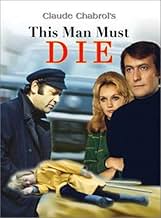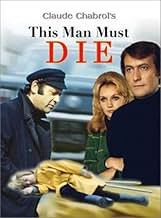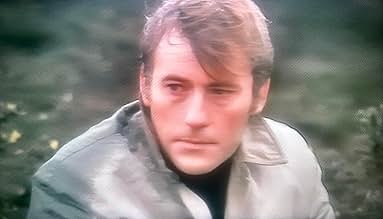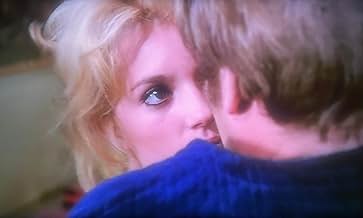IMDb RATING
7.6/10
5.2K
YOUR RATING
A man asserts himself within the life of an actress he believes is somehow responsible for his son's death.A man asserts himself within the life of an actress he believes is somehow responsible for his son's death.A man asserts himself within the life of an actress he believes is somehow responsible for his son's death.
- Director
- Writers
- Stars
- Awards
- 1 win total
- Director
- Writers
- All cast & crew
- Production, box office & more at IMDbPro
Featured reviews
Following a number of fairly mediocre efforts from the early to late sixties, Chabrol got right back on track with the excellent "Le Biches", and followed that film with "Que la bête meure", an intensely involving revenge drama with the emphasis on psychology and character over action and violence.
The film opens like any revenge thriller would (albeit probably better-shot and acted than most of them), with a child being killed in a hit and run and his father vowing to track down and kill the perpetrator. The tale slowly becomes more and more psychological, however, and ends up being a variation on a Greek tragedy, as others have noted. Chabrol is rarely content with following the expected routine (when he is his films can be dismal), and "Que la bête meure" is far from routine, as we end up spending more than an hour with the all the main characters in place and even together most of the time. The script is carefully written to avoid plot issues (outside of the contrived and silly first clue the main character gets, I can't think of any major issues I had with the script), and the dialogue is as deliberately orchestrated as Chabrol's direction is, building the suspense and drama gradually.
After the nearly continuous camera motion in "Les Biches", Chabrol takes a different approach to this film. It's less stylized and more natural, with the shot composition never feeling contrived as it sometimes did in Chabrol's immediately preceding effort, although there is some very good and very deliberate work around when we first meet the villain. Chabrol also uses close-ups to great effect, particularly in the scene late in the film with Paul and Charles on a sail boat.
What is striking about "Que la bête meure" is that while it deliberately builds suspense it also refuses to work as a thriller, and this is most clearly seen towards the end of the film when we get the standard twists but they're so subtle and low-key that one barely pays attention to them. The plot doesn't really matter here, the film is about much more, about the moral implications of revenge, about the nature of man, and it does well to apply these preoccupations to its characters so that we are never far removed from the emotions they are going through, in particular the main character Charles, played by Michel Duchaussoy.
After a string of disappointing features the last two years of the sixties saw two strong efforts from Claude Chabrol which helped keep him as relevant to cinema as he is. "Que la bête meure" is not a perfect film, and it may not even necessarily be a great film (although I think it qualifies), but it is engaging and enjoyable and far from empty. It leaves one thinking about it well after it has finished playing.
8.5/10
The film opens like any revenge thriller would (albeit probably better-shot and acted than most of them), with a child being killed in a hit and run and his father vowing to track down and kill the perpetrator. The tale slowly becomes more and more psychological, however, and ends up being a variation on a Greek tragedy, as others have noted. Chabrol is rarely content with following the expected routine (when he is his films can be dismal), and "Que la bête meure" is far from routine, as we end up spending more than an hour with the all the main characters in place and even together most of the time. The script is carefully written to avoid plot issues (outside of the contrived and silly first clue the main character gets, I can't think of any major issues I had with the script), and the dialogue is as deliberately orchestrated as Chabrol's direction is, building the suspense and drama gradually.
After the nearly continuous camera motion in "Les Biches", Chabrol takes a different approach to this film. It's less stylized and more natural, with the shot composition never feeling contrived as it sometimes did in Chabrol's immediately preceding effort, although there is some very good and very deliberate work around when we first meet the villain. Chabrol also uses close-ups to great effect, particularly in the scene late in the film with Paul and Charles on a sail boat.
What is striking about "Que la bête meure" is that while it deliberately builds suspense it also refuses to work as a thriller, and this is most clearly seen towards the end of the film when we get the standard twists but they're so subtle and low-key that one barely pays attention to them. The plot doesn't really matter here, the film is about much more, about the moral implications of revenge, about the nature of man, and it does well to apply these preoccupations to its characters so that we are never far removed from the emotions they are going through, in particular the main character Charles, played by Michel Duchaussoy.
After a string of disappointing features the last two years of the sixties saw two strong efforts from Claude Chabrol which helped keep him as relevant to cinema as he is. "Que la bête meure" is not a perfect film, and it may not even necessarily be a great film (although I think it qualifies), but it is engaging and enjoyable and far from empty. It leaves one thinking about it well after it has finished playing.
8.5/10
If there is a Gallic director who likes to surprise his admirers with new tricks,unexpected methods and iconoclastic stance,it is new wave master Claude Chabrol.There have been many bright moments in his illustrious career when he has made films for them which could only be appreciated by a sharp brain and attentive eyes.Que la bête meure is a hard to classify film which is neither a thriller nor a run of the mill revenge drama.It is a film which plays with all leading conventions of these two genres.This man must die starts well with the depiction of a reckless accident.It is quite possible that this might induce inattentive viewers to regard it as a revenge drama.This is not the case as viewers are quickly caught in a maze of crucial dramatic scenes that have direct bearing on film's progress.Caroline Cellier and Michel Duchaussoy perform well as lovers whose relationship has a lot of bearing on this film's progress.Chabrol is known for avoiding a not so happy end for his film.This is the reason why "This man must die" will prepare you to imagine your own type of end in order to do injustice to the concept of happy end of this film.
Claude Chabrol made a lot of films during his career, and while I've only really scratched the surface so far - I have to say that this one is right up there with his very best! Chabrol's films aren't thrillers in the same vein as those made by the likes of Alfred Hitchcock (in spite of the fact that he is often known as 'The French Hitchcock'); with Chabrol the thrills don't come from moments of suspense or tension, but from the interest generated in the lead characters and the situation put forward, and that was never truer than with this film - perhaps the most sombre revenge movie ever made! The film starts off with a young boy returning home from the beach. However, his stroll is interrupted when a car comes out of nowhere and runs him down. The boy's father, a man named Charles Thenier, is distraught following the accident and vows to track down the man who did it. His thirst for revenge is great, but his hatred towards the murderer is so immense that he decides, one he finds him, to befriend and lure him into a false sense of security before killing him...
Since there's not a great deal of excitement in the visceral sense, it may seem on the surface that This Man Must Die does not do its job as a thriller. However, this couldn't be further from the truth. Chabrol's film is brooding and intriguing throughout and has a great sense of realism in the way that the wronged father goes after the man who killed his son. It has to be said that the film somewhat hinges on coincidence, but this is actually addressed within the film itself and the events that take place are largely logical. Once again, Chabrol's production values are high and the film is incredibly beautiful and it bodes well with the sober tone of the movie. The acting is fantastic, with Michel Duchaussoy doing well in the lead role and receiving excellent feedback from the lovely Caroline Cellier and the brilliant Jean Yanne who steals every scene he's in as the villain of the piece. The film boils down to an excellent conclusion that both comes as something of a surprise and adds some Greek tragedy into the mix. Overall, this is another big success for the great French director and comes highly recommended!
Since there's not a great deal of excitement in the visceral sense, it may seem on the surface that This Man Must Die does not do its job as a thriller. However, this couldn't be further from the truth. Chabrol's film is brooding and intriguing throughout and has a great sense of realism in the way that the wronged father goes after the man who killed his son. It has to be said that the film somewhat hinges on coincidence, but this is actually addressed within the film itself and the events that take place are largely logical. Once again, Chabrol's production values are high and the film is incredibly beautiful and it bodes well with the sober tone of the movie. The acting is fantastic, with Michel Duchaussoy doing well in the lead role and receiving excellent feedback from the lovely Caroline Cellier and the brilliant Jean Yanne who steals every scene he's in as the villain of the piece. The film boils down to an excellent conclusion that both comes as something of a surprise and adds some Greek tragedy into the mix. Overall, this is another big success for the great French director and comes highly recommended!
This is a very fine psychologic thriller in some mellow tones. The story is simple : a boy gets killed by a mad car driver and his father wants to find the man to kill him. We know, from the start, that there can be two finale : the father kills the man, or he changes his mind. But Chabrol makes us think that it can have another finale... Or another? Or perhaps this one? Not at all! We never thought of the real finale. This is brillant, well written and directed movie. Very fine acting by Duchaussoy and Yanne.
With 'Que la bete meure' (The English title is 'This Man Must Die' and is inspired by a novel by Cecil Day-Lewis, yes, the father of ... ) Claude Chabrol ends the decade of his consecration as one of the most talented and prolific French film directors of the second half of the 20th century. He had started the 60s as a New Wave theorist and one of the most daring directors of this current and he ends it as a well-known director and one who is very close if not part of the mainstream. Along the way, he made 15 feature films, most of them thrillers, almost all inspired in one way or another by Alfred Hitchcock's films. The master of suspense was not only an idol for the directors of the French New Wave, but he also watched them with interest and he dialogued with them, literally and even artistically. For Chabrol, 'Que la bete meure' marks not only the end of an excellent decade of film directing, but also represents one of his best and most original films.
Most of the story takes place on the Breton shores of the ocean, in the villages and especially on the roads near the cliffs. The film begins with the traumatic intersection of two destinies - a child who returns from picking shells on the ocean shore is killed by a car in a hit-and-run accident. The father, a writer of books for children (Michel Duchaussoy) vowes to dedicate the rest of his life to finding the person responsible for his son's death and murder him. He entrusts his thoughts of revenge to a personal diary that will play a key role in the story. The private investigation, with a little luck, leads the hero to identify the probable culprit quite quickly, but that the revenge plans turn out to be more complicated than expected. As in many of Chabrol's films, we come to know a French bourgeois family in which nothing corresponds to appearances, and in which the hatred of members towards the head of the family comes to resemble the situations in Agatha Christie's detective novels in which almost all characters have good reasons to commit the crime. It is a very well written script, with romantic elements, suspense and social criticism, all under the sign of revenge, and which also has the quality of an ending that does not try to solve everything but lets the viewer to choose his favorite interpretation. By the way, the dialogues are written by Chabrol, but the script is inspired by a book by Cecil Day-Lewis, yes, the father of ...
Michel Duchaussoy and Caroline Cellier do their jobs well in the role of the vengeful father and of the star actress with whom the writer begins a relationship in order to reach her brother-in-law, the main suspect. As often, however, the negative role is the one that proves to be the most interesting and JJean Yanne eclipses the two, although he enjoys less screen time. The cinematography, as always at Chabrol, is excellent. Beyond the tranquility of the landscapes or in the luxury of bourgeois houses, the dramas are hidden and the tension is ready to erupt at any moment. 51 years after the premiere, the world of 'Que la bete meure' seems much simpler, without mobile phones and the Internet, but the effect is that in their absence we get faster to the essence of the feelings and passions of the characters - and here nothing looks old-fashioned. It is one of Chabrol's most carefully designed and best-written films - recommended viewing.
Most of the story takes place on the Breton shores of the ocean, in the villages and especially on the roads near the cliffs. The film begins with the traumatic intersection of two destinies - a child who returns from picking shells on the ocean shore is killed by a car in a hit-and-run accident. The father, a writer of books for children (Michel Duchaussoy) vowes to dedicate the rest of his life to finding the person responsible for his son's death and murder him. He entrusts his thoughts of revenge to a personal diary that will play a key role in the story. The private investigation, with a little luck, leads the hero to identify the probable culprit quite quickly, but that the revenge plans turn out to be more complicated than expected. As in many of Chabrol's films, we come to know a French bourgeois family in which nothing corresponds to appearances, and in which the hatred of members towards the head of the family comes to resemble the situations in Agatha Christie's detective novels in which almost all characters have good reasons to commit the crime. It is a very well written script, with romantic elements, suspense and social criticism, all under the sign of revenge, and which also has the quality of an ending that does not try to solve everything but lets the viewer to choose his favorite interpretation. By the way, the dialogues are written by Chabrol, but the script is inspired by a book by Cecil Day-Lewis, yes, the father of ...
Michel Duchaussoy and Caroline Cellier do their jobs well in the role of the vengeful father and of the star actress with whom the writer begins a relationship in order to reach her brother-in-law, the main suspect. As often, however, the negative role is the one that proves to be the most interesting and JJean Yanne eclipses the two, although he enjoys less screen time. The cinematography, as always at Chabrol, is excellent. Beyond the tranquility of the landscapes or in the luxury of bourgeois houses, the dramas are hidden and the tension is ready to erupt at any moment. 51 years after the premiere, the world of 'Que la bete meure' seems much simpler, without mobile phones and the Internet, but the effect is that in their absence we get faster to the essence of the feelings and passions of the characters - and here nothing looks old-fashioned. It is one of Chabrol's most carefully designed and best-written films - recommended viewing.
Did you know
- TriviaThis film is based on a British novel of the 1930s written by the poet C. Day Lewis (under the pseudonym "Nicholas Blake") and is one of several novels by him to feature as its hero the brilliant amateur sleuth Nigel Strangeways. This adaptation, in addition to moving the action to modern-day France, entirely leaves out this leading character (or any new French character equivalent to him).
- GoofsAt the beginning Paul is shifting several times although the Mustang has an automatic transmission.
- ConnectionsFeatured in Le cinéma passe à table (2005)
- Soundtracks4 ernste Gesänge Op. 121
Music by Johannes Brahms (as Brahms)
Performed by Kathleen Ferrier (as Katleen Ferrier)
Disque DECCA ACL 306
- How long is This Man Must Die?Powered by Alexa
Details
- Release date
- Countries of origin
- Language
- Also known as
- Neka zvijer krepa
- Filming locations
- Argol, Finistère, France(Exterior)
- Production companies
- See more company credits at IMDbPro
- Runtime
- 1h 50m(110 min)
- Sound mix
- Aspect ratio
- 1.66 : 1
Contribute to this page
Suggest an edit or add missing content

































